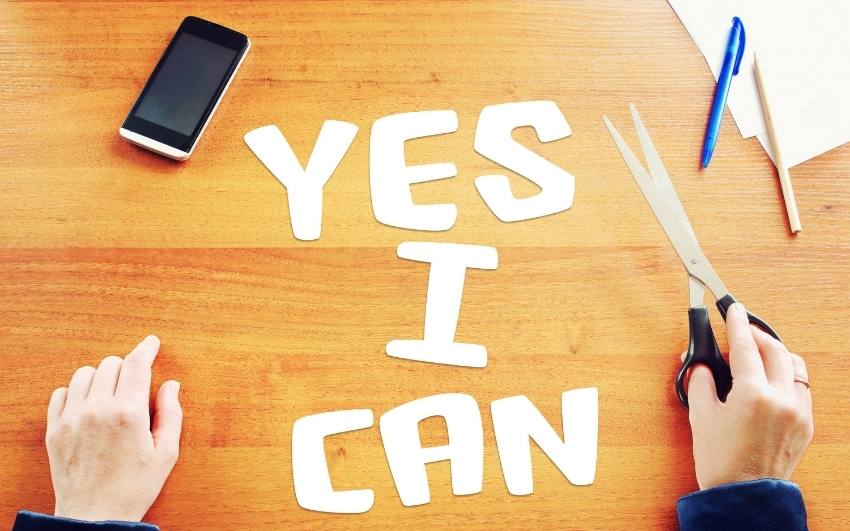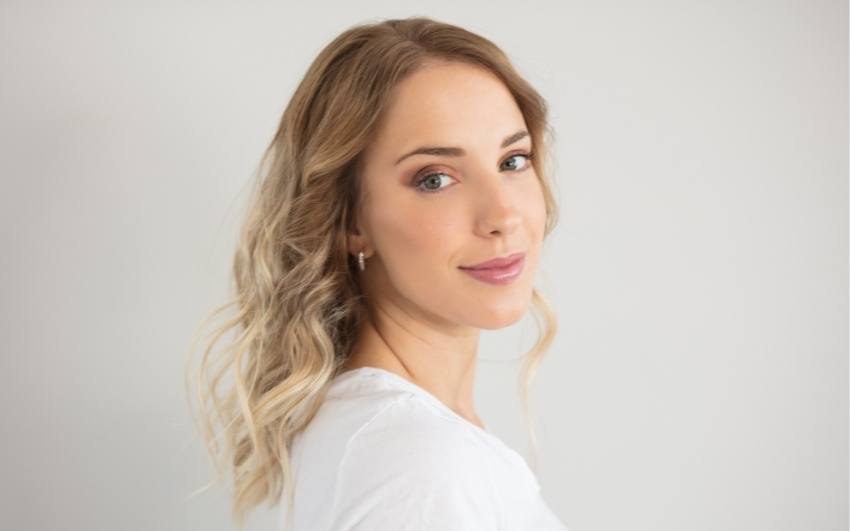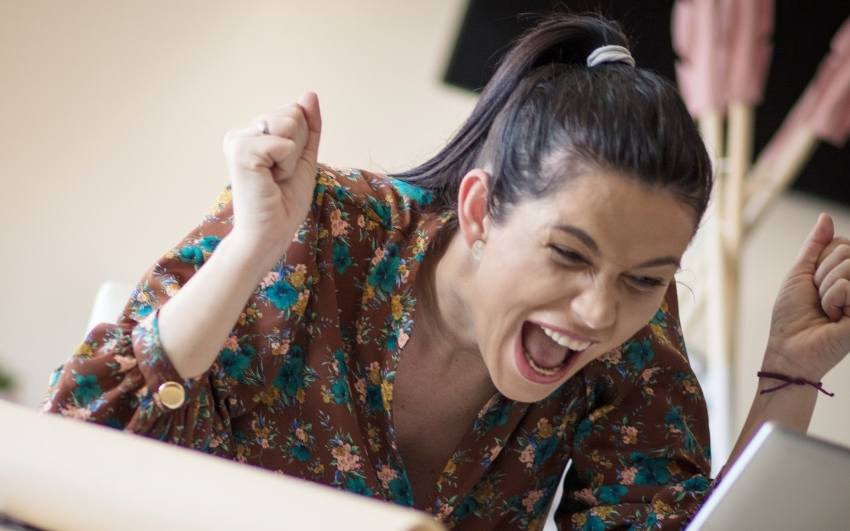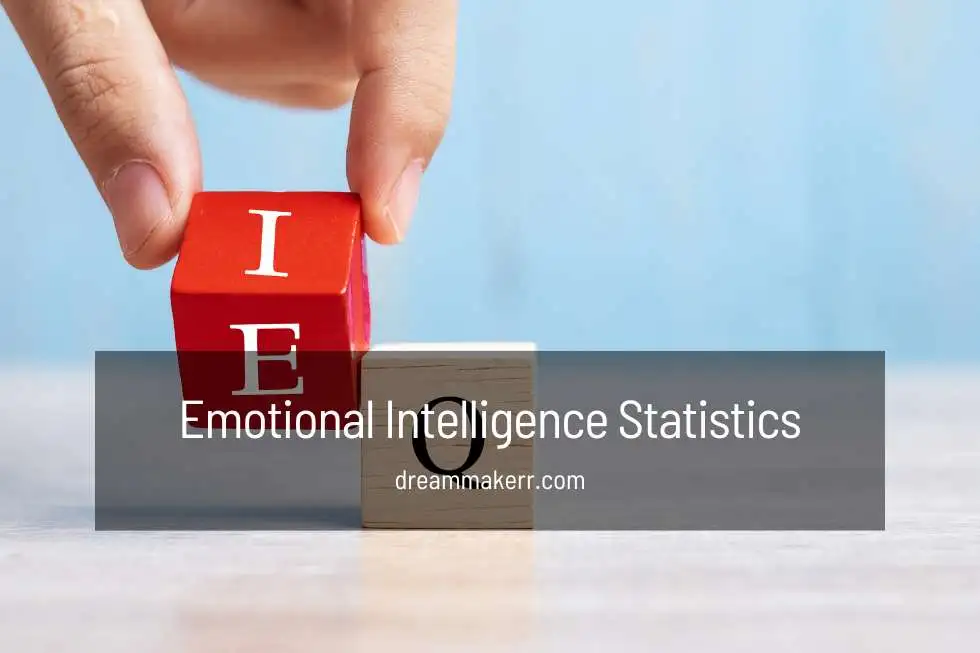On this page

How To Start Believing in Yourself And Your Abilities
When you start believing in yourself and your abilities, it not only aids us in attaining our objectives and fulfilling our goals, but it also contributes to our happiness.
However, the converse is also true.
- When we don’t have faith in ourselves, we are less likely to act, modify, or strive to making things better.
- In fact, when we anticipate failure, things start to go wrong.
- Believing in ourselves and our abilities is like the key that starts the car.
- We can’t really get anywhere without it.
We try to move ahead but are stopped because our beliefs, attitudes, and behaviors are out of sync with our objectives.
So we either don’t do what we need to or sabotage ourselves along the way, whether it’s in apparent ways or unconsciously.
So, how do you think people perceive you?
What is Your Self Confidence Level?

Self-esteem, self-confidence, self-trust, autonomy, and environmental mastery are all examples of believing in oneself.
- Self-worth is the feeling that you are valuable as a human being.
- Self-confidence is a positive attitude toward your talents, characteristics, and judgment.
- Self-trust is the belief that you can count on yourself.
- Autonomy is the ability to decide and manage your own actions.
- Your vision of environmental mastery is that your actions will produce the desired changes.
Here are the most essential aspects of believing in yourself. Perhaps you struggle with one or all of these issues.
It will be simpler to start changing your self-perceptions if you know where your difficulties are.
Now, let’s look at the meaning of self-confidence.
What is Meant by The Statement “Believing in Yourself”?

Believing in oneself entails confidence in one’s abilities. It refers to putting trust in oneself to accomplish what you promise and knowing that your efforts will pay off.
That is, you must believe in yourself as a result of numerous critical psychological events, such as:
- self-esteem
- self-confidence
- self-trust
- autonomy
- environmental mastery
We’ll go through each of these components in depth and explain why addressing them might help you trust yourself more.
The Importance of Believing In Yourself

When we learn how to believe and have faith in ourselves, it activates a number of psychological processes that help us achieve our goals, fulfill our dreams, and improve our well-being.
The flip side is also true.
We are less likely to act, change, or try to improve things if we don’t trust ourselves or lack confidence in ourselves.
As a result, we anticipate and receive failure.
Consider it as if you were trying to start a car. We can’t get anywhere until we’ve got it.
We try hard to move ahead, but we are blocked since our ideas, emotions, and behaviors are out of sync with our objectives. As a result, we either don’t do what we should or sabotage ourselves along the road, both sometimes in obvious ways and other times in more subtle methods that are entirely unconscious to us.
What are the psychological reasons we don’t believe in ourselves, given how essential self-confidence is?
Four Reasons Why We Don’t Believe in Ourselves

We all have that little voice inside our heads that tells us we can’t do something. For some of us, that voice is a little louder than others.
Here are the four main reasons why we don’t believe in ourselves:
1. Programming
We’ve been programmed to doubt ourselves since birth. Society, our families, and even well-meaning friends have instilled the message that we’re not good enough. As a result, we grow up thinking that we have to be perfect to be liked and accepted.
We have been programmed to think and believe certain things about ourselves that are not true.
2. Ego-based thinking
Another reason we don’t believe in ourselves is because of ego-based thinking. This is when we allow our egos to get in the way and convince us that we’re not good enough. Our egos are always looking for validation and approval from others, which can prevent us from taking risks or stepping outside our comfort zones.
3. Limiting beliefs
Lastly, a lot of our self-doubt comes from our own limiting beliefs. These are the negative thoughts and stories that we tell ourselves about who we are and what we’re capable of. We often believe these things because they’ve been reinforced by our past experiences or the people around us.
4. Wrong focus
It is important to have focus in order to achieve anything in life. Without focus, our attention is pulled in too many directions and we are unable to give our full attention to anything. This can lead to us feeling scattered and uncertain, and makes it difficult to achieve our goals. While it is important to be able to juggle multiple tasks, it is also important to know when to say no in order to maintain our focus.
When we are focused on the wrong things, we not only waste our time and energy, but we also miss out on opportunities to achieve our true potential. In order to be successful, we must learn to set aside distractions and remain focused on what is most important.
- We tend to compare ourselves to others and judge ourselves harshly.
We focus on our flaws and all the things we’re doing wrong. We think that we’re not good enough or that we’ll never be successful.
These negative thoughts keep us stuck in our comfort zones and prevent us from taking risks or going after our dreams.
If you want to overcome self-doubt, it’s important to become aware of your negative thoughts and beliefs. Once you’re aware of them, you can start to challenge and reframe them.
- We focus on our negative qualities rather than our positive ones.
We think that we’re not good enough.
These thoughts prevent us from taking risks or going after our dreams.
In order to overcome self-doubt, it is important to become aware of your negative thoughts and beliefs, and once you are aware of them, begin to challenge and reframe them.
Self-doubt can hold you back from achieving your goals and living a fulfilling life. If you want to overcome self-doubt, start by becoming aware of your negative thoughts and beliefs. Once you’re aware of them, you can begin to challenge and reframe them. With time and effort, you can learn to silence your inner critic and start living the life you want.
Three Reasons Why We Don’t Believe in Our Abilities
We all have doubts about ourselves from time to time. Whether it’s wondering if we’re good enough for a new job or doubting our ability to complete a project, self-doubt can creep in and prevent us from reaching our full potential. In many cases, these doubts are unfounded and based on erroneous thinking. Here are three common reasons why we don’t believe in our abilities:
1. Self-image
One of the main reasons why we don’t believe in our abilities is because we have a negative self-image. We see ourselves as unworthy, incapable, and undeserving of success. This type of thinking is based on irrational beliefs that we hold about ourselves. If we believe that we’re not good enough, then it’s unlikely that we’ll ever feel confident about our abilities.
2. Competitive mindset
Another reason why we might not believe in our abilities is that we compare ourselves to others. We see other people who are more successful than us and feel that we can never measure up. This competitive mindset creates feelings of insecurity and self-doubt. It’s important to remember that everyone is on their own journey comparisons are meaningless.
Perfectionism
This is another common obstacle that prevents us from believing in our abilities. We set unrealistic standards for ourselves and beat ourselves up when we don’t meet them. This perfectionism can become a self-fulfilling prophecy—if we believe that we’re never good enough, then we’ll never reach our full potential.
We think we need to be perfect.
The truth is that we don’t. We are human beings, and we are imperfect. It’s important to accept our flaws and work with them instead of against them.
I’m not good enough.
This is a common belief that holds people back from achieving their goals. We think that we need to be perfect in order to be successful, but the truth is that we don’t. Everyone has flaws, and it’s okay to embrace them. Instead of thinking “I’m not good enough,” try thinking “I am doing my best.” This will help you to move forward and achieve your goals.
3. Focusing on our mistakes
It’s easy to focus on our mistakes and dwell on them. But it’s important to remember that everyone makes mistakes. What’s important is how we learn from them and move on. instead of dwelling on your mistakes, focus on what you can do to improve and make sure that you don’t make the same mistake again.
Everyone makes mistakes, and that’s okay. What’s important is how we learn from them and move forward. Instead of dwelling on your mistakes, focus on what you can do to improve and make sure that you don’t make the same mistake again. This will help you to achieve your goals and be successful.
What False Beliefs do I Have About Myself?
The first step in increasing our belief in ourselves is to recognize the false beliefs we have about ourselves.
- I am not good enough.
- I am not smart enough.
- I am not pretty enough.
- I am not talented enough.
- I am not lovable enough.
- I am not worthy enough.
All of these false beliefs stem from a lack of self-love and self-worth. If we do not love and accept ourselves, it can be very difficult to believe that we are good enough, smart enough, pretty enough, talented enough, and lovable enough. It is only when we truly love and accept ourselves that we can start to believe in ourselves.
Here’s a list of multiple ways to start believing in yourself.
How to Start Believing in Yourself

It can be hard to start believing in yourself and your abilities, especially when you feel like you’re not good enough. But if you want to succeed in life, it’s important to have faith in your own abilities.
Here are ten ways to start believing in yourself:
1. Acknowledge your accomplishments
Give yourself some credit! Acknowledge your accomplishments. Checking things off your to-do list day after day, week after week, can start to feel like a mindless grind. Make sure you’re actually acknowledging your successes along the way—no matter how small they may seem. Doing so will help prevent you from getting bogged down and stressed by the day-to-day.
2. Be positive
Try to focus on the good things in your life and avoid dwelling on negative thoughts. When you catch yourself thinking something negative, counter it with a positive thought. We don’t need to be positive all the time, but having a positive outlook will help you believe in yourself more.
Positivity is a way of life for true believers; they see the best in people and the glass as half full instead of half empty.
They know that hope fuels happiness and they dwell on what they are grateful for. optimists because they understand that a negative mindset will only breed more negativity.
If you want to change your life for the better, start by changing your attitude and bad things will start happening less frequently.
3. Set incremental goals
When you have specific goals to achieve, it’s easier to see your progress and measure your success. Having goals also gives you something to work towards, which can help motivate you. Make sure your goals are realistic and attain
We think we need to be perfect but no one is. Allow yourself to make mistakes and learn from them. Be patient with yourself as you work towards your goals.
4. Be mindful of your thoughts and emotions
Your thoughts and emotions play a big role in how you feel about yourself. If you’re constantly putting yourself down or dwelling on negative thoughts, it’ll be hard to feel good about yourself. Practice mindfulness and try to be aware of your thoughts and emotions. Accept them but don’t dwell on them.
6. Be accepting of compliments
Compliments are a great way to boost your self-esteem. But sometimes it can be hard to accept compliments, especially if you don’t feel good about yourself. Try to remember that the person giving you the compliment sees
5. Learn from your mistakes instead of beating yourself up about them
Be encouraging and positive with yourself, as you would be with a friend.
We compare ourselves to others a lot, but everyone is on their own journey. Focus on your own progress and celebrate your successes, no matter how small they may seem.
6. Find things that make you happy and do them often
Do things that make you happy and make you feel good about yourself. This can be anything from spending time with friends and family, doing a hobby you enjoy, or taking care of yourself by eating healthy and exercising. When you do things you enjoy, it’ll be easier to appreciate yourself.
7. Practice self-compassion
Start by practicing self-compassion. Treat yourself with kindness and understanding, just as you would treat a good friend. Remember that you are imperfect and perfectly human, just like everyone else. When you make a mistake, cut yourself some slack and forgive yourself. Be patient with yourself as you learn and grow. And always remember to be gentle with yourself – we all deserve compassion and understanding.
8. Seek professional help if you need it
If you’re struggling to cope with your low self-esteem, don’t be afraid to seek professional help. A therapist can teach you how to change the negative thoughts and beliefs that are causing you to feel bad about yourself. If you don’t have access to therapy, there are many helpful books and online resources that can also be of assistance.
9. Take care of yourself
If you want to feel better about yourself, it’s important to take care of yourself both physically and emotionally. Make sure to get plenty of rest, eat a healthy diet, and exercise regularly. It’s also important to find ways to relax and destress.
Consider activities like yoga, meditation, or start journaling.
Taking care of yourself will not only improve your self-esteem, but it will also make you happier and healthier overall.
10. Forgive yourself for your past mistakes
One of the most common reasons why people are unable to enjoy a joyful and successful life is due to their inability to forgive themselves for past mistakes. We all make errors; it’s part of being human. But focusing on these blunders and beating yourself up over them may prevent you from progressing and enjoying your life.
What’s The Psychology of Believing In Yourself

The psychology of believing in yourself is an interesting topic that has been studied by many psychologists over the years.
There are a number of different theories about why people believe in themselves, and what factors contribute to a person’s self-confidence.
Some theorists believe that self-confidence is based on past experiences and success. If a person has experienced success in the past, they are more likely to believe in themselves and their ability to succeed again in the future.
Other theorists believe that self-confidence is based on the ability to control one’s environment and Master list to predict outcomes. If a person feels like they can control their environment and predict the future, they are more likely to have confidence in their own abilities.
Whatever the reason, self-confidence is an important factor in achieving your goals and success.
Believing in oneself can be the difference between succeeding and failing. It gives people the courage to take risks and try new things. It also helps people to persevere when things get tough. Those who believe in themselves are more likely to achieve their goals and reach their full potential.
So if you want to be successful, start by believing in yourself!
The power of believing in yourself
As any successful person will tell you, self-belief is essential to achieving your goals. When you believe in yourself, you exude confidence and charisma, two traits that can open doors and help you to overcome obstacles.
What’s more, self-belief can be contagious; if you believe in yourself, others will believe in you too. Of course, self-belief is not a magic wand that will automatically make your dreams come true.
However, it is a powerful tool that can help you to achieve your full potential. So if you’re looking to make positive changes in your life, start by believing in yourself – it might just be the most important decision you ever make.
Which Components of Self-Belief Do You Struggle With?
Ask yourself the following questions to figure out where your self-belief is getting stuck:
- Self-worth: Do you have a firm belief in your human worth? Do you think you’re no worse than anybody else?
- Self-confidence: Do you feel good about your talents and capabilities? Do you feel confident in your personal characteristics? Do you feel positive about your judgment and decision-making?
- Self-trust: Is your self-esteem good? Can you trust yourself? Are you confident in the ability to carry out what you promise?
- Autonomy: Do you feel free to live your life as you choose? Do you think that no one can prevent you from achieving your goals?
- Environmental mastery: Do you believe that taking action will lead to the desired results? Do you think you’re successful in obtaining what you want?
If you picked “no” or were leaning that way to any of these questions, you’re probably missing out on believing in yourself because of these areas.
Environmental mastery and autonomy are two topics where I have a hard time. It’s due to my many experiences of being ineffective in achieving what I desired despite all efforts. My mistakes taught me to question myself.
What do you think? What difficulties do you face? Can you think of events from your past that have led to the development of these beliefs about yourself, as outlined above?
Conclusion
It may help to think of confidence as a muscle. You may be able to push yourself farther than you think possible if you believe in yourself and don’t give up!
Developing and maintaining a good self-image isn’t as simple as it appears. It’s more about recognizing our limitations and how to overcome them than forcing ourselves to develop self-love and achieve our goals.
I believe that someone who tries and fails eventually wins by increasing his or her self confidence levels.
To start believing in yourself comes at a price, but it’s worth it.
When you start believing in yourself, you’ll start asking for what you want in life, not just being satisfied with the crumbs.
Hopefully, this was a helpful beginning point for you.
Faqs
What are the benefits of believing in yourself?
Most people would agree that there are benefits to having faith in oneself. How to have faith in yourself if you don’t believe in your ability to accomplish a task, why would you even bother trying? Self-belief often leads to increased motivation and higher levels of productivity.
People who are used to believing in themselves are also more likely to take risks and step outside their comfort zone. This can lead to new opportunities and experiences that might not have been possible otherwise. Additionally, self-confidence contributes to overall mental and physical well-being.
People who feel good about themselves tend to be happier and healthier than those who don’t. So, whether you’re looking to boost your career or your health, increasing your self-belief is a great place to start.
What happens when you start believing in yourself?
When you start believing in yourself, you open up a world of possibilities. No longer bound by self-doubt, you become free to chase your dreams and accomplish great things. Your newfound confidence will inspire others to believe in you as well, creating a snowball effect that leads to even more success.
As your belief in yourself grows, you’ll find that you’re able to take on bigger challenges and achieve even higher levels of success. Soon, you’ll be unstoppable. So what are you waiting for? Start believing in yourself today and see where it takes you!
Why is it hard to believe in yourself?
Most people would say it’s because they don’t have enough confidence. They look at all of their flaws and think that they’re not good enough. They compare themselves to others and wonder why they can’t be more like them. These are all valid reasons, but there’s another reason that’s often overlooked.
The reason is that we live in a society that constantly tells us we’re not good enough. We see it in the media, in the ads, and even in the way people talk to each other.
We’re bombarded with messages that tell us we need to be thinner, smarter, richer, and more successful. It’s no wonder we have a hard time believing in ourselves when we’re constantly being told we’re not good enough.
The next time you find yourself doubting your abilities, remember that you’re not alone. Millions of people struggle with self-doubt every day. But try to focus on your positive qualities and remember that you are worthy of love and respect, just like everyone else.
How to start believing in yourself and be confident?
Self confidence and having faith in yourself is something that you build up over time through positive experiences. When you feel good about yourself and your abilities, it allows you to take risks and venture into new territory without fear of failure. There are many ways to build confidence, but one of the most effective is simply to challenge yourself on a regular basis.
How do I believe in myself? By taking on new challenges and trusting in your abilities, you can gradually increase your self-confidence. Additionally, it can be helpful to seek feedback from others and to learn from your mistakes. Over time, these practices will help you to develop a belief in oneself, a stronger sense of self-belief, and confidence in your abilities.
How do you believe in yourself?
This is a question I get a lot, and it’s one that I have struggled with for a long time. I think a lot of us do. We live in a world that tells us we’re not enough, that we’re not good enough, and that we’ll never be good enough. And it’s hard to silence those voices.
But I think the first step is to understand that those voices are not necessarily true. They’re just the voices of our fears and our doubts, magnified. And once we understand that, we can start to question them.
We can start to ask ourselves: What would I do if I weren’t afraid? What would I do if I knew I could succeed?
And then, we can start to take those small steps forward. We can start to believe in ourselves just a little bit more each day.
It won’t be easy. But it will be worth it. Because when we believe in ourselves, anything is possible.

Petri Maatta is a mindset coach and neuroscience-focused author with 15 years of experience in personal transformation and success psychology. After seven years of business failures, he discovered the power of manifestation through a Fortune 500 mentor. Now, he shares neuroscience-backed strategies through DreamMaker membership, helping others transform their businesses and lives on their own terms.
Read My Story here.
Share This Story, Choose Your Platform!
You want to manifest a new car, but you’re wondering: Does this really work? Here’s
Many smart individuals are often linked with having a high IQ. However, according to emotional
According to online dating statistics over 90% of people believe in love at first sight,




